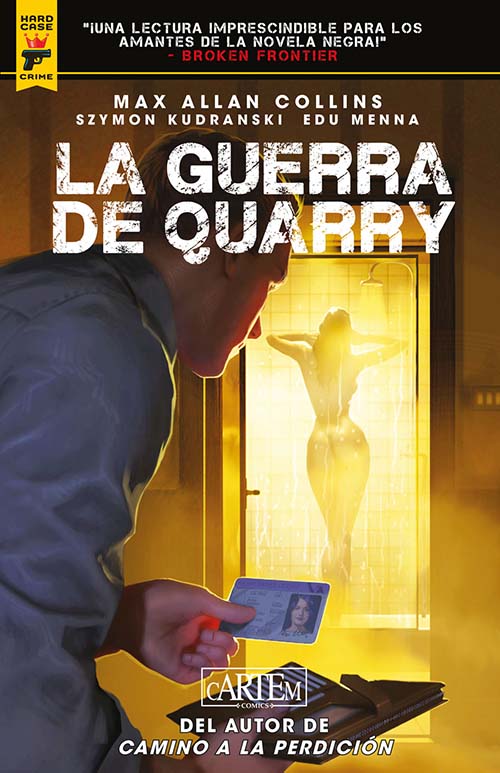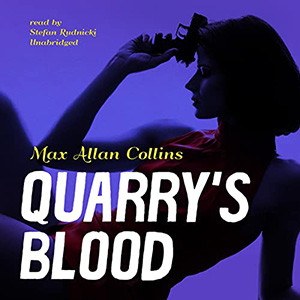It’s been ages since I’ve had a New York Times review of one of my novels. I’ve had some nice write-ups there – don’t recall a bad one – but this is the first ever Quarry novel the Times has reviewed. Here goes:
Retirement, however, is put on ice when a true-crime writer, Susan Breedlove, shows up at Quarry’s door looking for some answers. Her arrival opens a portal into full-on metafiction, as the line between what Collins has published since the mid-1970s and what has spilled out into the actual world (like a television adaptation) grows so porous as to cease existing.
It goes without saying that the body count will pile up, and that Quarry, despite his aching body and slower reflexes, still operates at a more ruthless clip than almost anyone he encounters. This is a sure-footed ending to a series that marinated in the excesses of pure pulp.
That’s a swell review, but what’s interesting to me is to how the word “pulp” has become a compliment in recent years – possibly thanks to Quentin Tarantino’s Pulp Fiction – when for decades it was a pejorative. Now it denotes a certain style of fiction (often consciously retro) viewed with a positive, even affectionate spin.
Equally interesting to me is that this is the first I’ve had a paperback original reviewed in the Times, at least that I can remember.
So far the reader response, and reviewer reaction, has been very warm indeed to the new Quarry. It was a risky novel to write, as you readers of the book already know, because I ventured into “meta” territory, big-time. I don’t want to say more, but I will say that one of the things I dealt with is just what exactly Quarry has been writing in these first-person narratives all these years.
Out right now is the audio book of Quarry’s Blood, read by the wonderful Stefan Rudnicki. The cover is pictured here. I have not listened to the audio yet, but will begin sometime this week, when we take a day off to celebrate my 74th birthday. (It’s March 3rd, not yet a national holiday.)
Stefan has become the voice of Quarry for me, just as Dan John Miller is Nate Heller.
Check out an excerpt here:
I am working on the new Heller novel now, ridiculously immersed in it, and for that reason this will be a short update. I would like to respond to Bill P’s follow-up comment on a discussion about writing, readers and reviewers that’s been going on for a few weeks here. I misunderstood Bill’s use of “archetype,” thinking he meant the characters I write about; but he was thinking of the archetypical reader I envision.
I accidentally answered that, by saying that I write to please myself, and my wife Barb, who is my first reader as I go along (meaning she reads the chapters as I complete them). I do, however, envision a reader. I don’t think specifically of a male or female, just someone who shares my interests and tastes, and the ideal reader is probably of my generation or the generation or two on either side of mine. A major part of my approach is my assumption that the reader is at least as smart as I am. He or she might be smarter, but not so much smarter that my work seems childish or beneath them. I never assume – never – that the reader isn’t as smart as I am. I endeavor never to write down.
The only slight exception – the only “sort of” exception – is when I write a first-person story in the voice of someone not as smart as me. I’ve only done this a few times, and it’s tricky (Shoot the Moon is one). This relates as well to writing in the point of view (when in third person) of someone who isn’t as smart as me. Who might be dumb, like Lyle in Spree. All I can say is that these characters never think of themselves as dumb, just as the antagonists of the protagonists never think of themselves as the villains.
I’ve made it clear here that I abhor writing that tries to impress – that spends too much time showing off. In this approach, the story almost always pays the price.

I wanted to share with you this cover of the graphic novel Quarry’s War in Spanish.
I don’t remember Quarry appearing in Spain before. Road to Perdition did, which may be what led to this edition.
Here is a very smart review of Quarry’s Blood. This reviewer is always worth reading.
M.A.C.
Tags: New Releases, Quarry, Quarry's Blood, Quarry's War, Reviews, Road to Perdition


I am so excited to dive into this one. It sounds like it is one for the ages. Thank you for this and all of them, Max.
Finished “Quarry’s Blood” last week and loved it! One of the best in the series (definitely top 5, at least). I guess everyone has their own image of Quarry — to me, Robert Forster would have been a great Quarry (with James Coburn as the Broker).
Happy Birthday Max! I decided to start out my Quarry quest with Blood. I’m so happy for you the book was reviewed by the N.Y. Times but they never impressed me much. The most impressive part of your career for me is the quantity and quality of your production. Quarry seems ready to be made into a T.V. series I hope Netflix or Prime has already made you an offer. Good luck and I hope you have at least 10 more Heller novels in you.
Thanks again for the continued discussion on my previous comments. I have never felt written down to, so I believe you have achieved your objective. My copy of Quarry’s Blood is next in the queue; it is hard to read some of these reviews etc while trying to avoid any spoilers or other plot points. Should be soon, though Gus & Call have only just started their drive so I have plenty of trail in front of me before I get to Iowa!
It is interesting how words change context. Tarantino enjoyed grindhouse cinema (very low budget, exploitation, cheesy, etc), yet it has its own set of fans who appreciate it for what it is. Some cinematographers now attempt to emulate the visual styles and the tropes from this otherwise low-brow from of cinema. Another term that would follow your “pulp” analogy is the genre of music now termed “Yacht Rock.” It was never called that in its day and the initial internet TV series that popularized the term was just as much a parody of the music as it was any form of homage. A music that might have been disdained by then critics is now revisited, rehabilitated, and appreciated by a new set of listeners.